#gabriel marcel
Text

[Albert Camus, Gabriel Marcel, Jean- Paul Sartre.]
#s15e01 unconventional comforts#guy fieri#guyfieri#diners drive-ins and dives#jean- paul sartre#albert camus#gabriel marcel
142 notes
·
View notes
Text
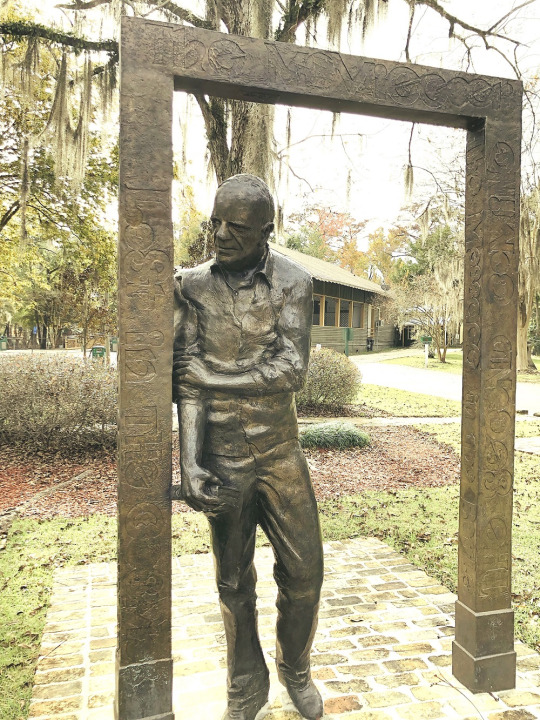
Walker Percy statue in Bogue Falaya Park, Covington, Louisiana
“A Talk with Walker Percy
Zoltán Abádi-Nagy
The Southern Literary Journal, 6 (Fall 1973)
Q: You maintain that perhaps the best way of writing about America in general is to write with authenticity about one particular part of America. By extension this means that, likewise, your attitude and reaction toward philosophical questions of universal human importance— toward the question of the human predicament, to use the term of your philosophy—will be that of an American. Is that correct?
A: I think that is true. My novels have more a European origin than American. They are so-called philosophical novels which is probably a bad word. But you know that the first half of your question is quite true. The greatest exponent of this was Faulkner who concentrated on a small village in Mississippi. It is true that I am interested in philosophical, religious issues and in my novels I use the particular in order to get at the general issues. For example, The Moviegoer is about New Orleans, one part in New Orleans, a young man in New Orleans. The conflict is a hidden ideological conflict involving, on the one hand, what I call Southern stoicism. I have an uncle whose hero was Marcus Aurelius. The other ideology is Christian Catholic. The third: the protagonist is in an existentialist predicament, alienated from both cultures.
Q: What in your view is it in America that makes an existentialist today? What facets of the American intellectual climate, of the American existence in general, are favorable to existentialist thinking?
A: I think in America the revolt is less overtly philosophical. It is a feeling of alienation from American suburban life, the suburb, the country-club, the business community. There is a difference between my protagonists and the so-called counter culture. Many young people revolt in a purely negative way, oppose their parents' culture; whereas the leading characters in my books are much more consciously embarked on some sort of search. I am telling you that because I would not want you to confuse the characters of the counter culture with my characters. One of their beliefs is that the American scene is phony, and their revolt is to seek authenticity in drugs, sex, or in a different kind of communal existence. The characters in my books are embarked on a much more serious search for meaning.
(…)
Q: Your view of life in your literary works is very close to the absurdist view, but the term 'absurd' and the whole Camus terminology hardly ever appears in your philosophical essays. Does this coincide with your preference for Marcel's Catholic version of existentialism as opposed to the post-Christian character of the meaninglessness of Sisyphus' situation?
A: Yes, that is correct. I identity philosophically with people like Gabriel Marcel. And if you want to call me a philosophical Catholic existentialist, I would not object, although the term existentialist is being so abused now that it means very little. But stylistically mainly two French novels affected me: Sartre's La Nausée and Camus' L'etranger. I agree with their novelistic technique but not with their absurdist view.
Q: Is not your third novel, Love in the Ruins, with its Layer I and Layer II—the social self and the inner, individual self—a comic attempt to solve Marcel's dilemma about this separation?
A: You are right. This is a comic device to get at what, ever since Kierkegaard, has been called the modern sickness: the disease of abstraction. I think in the novel Dr. More calls the illness angelism-bestialism. There is nothing new about this. It had been mentioned by many writers in various ways. Pascal said that man is both not quite as high as an angel and not quite as low as a beast. So Dr. More is aware of this schism in consciousness. He talks about the modem mind which, as he sees it, abstracts from the world, from itself, and manages to lose touch with reality.
(…)
Q: Much of it, especially in Love in the Ruins, seems to be a social problem viewed from an existentialist viewpoint of the human predicament. Actually, this is a kind of movement I notice in your works: an increasing awareness of how much the social predicament has to do with the human predicament. If Binx in The Moviegoer was suffocating in an adverse climate of malaise which was a social phenomenon, he was not much aware of its having to do with society; he was not concentrating on things like the social self as later Dr. More is in Love in the Ruins. Was this an intentional change on your part or was the movement towards the concept of malaise as a social product spontaneously developing through the inner logics of these relations?
A: It was a conscious change. Love in the Ruins was intended to take a certain point of view of Dr. More's and from it to see the social and political situation in America. Unlike Binx, whose difficulties were more personal, Dr. More finds himself involved in contemporary issues: the black-white conflict and the problem of science, scientific technology which is treated as a sociological reality today. Both the good and bad of it. I really use this to say what I wanted to say about contemporary issues. About polarization; there are half a dozen of them: black-white, North-South, young-old, affluent-poor, etc. And do not forget that at the end of Love in the Ruins there is a suggestion of a new community, new reconciliation. It has been called a pessimistic novel but I do not think it is. A renewed community is suggested. The suggestion is in the last scene which takes place in a midnight mass between a Christmas Saturday and Sunday. The Catholics, the Jews come to the midnight mass, also the unbelievers in the same community. The great difference between Dr. More and the other heroes is that Dr. More has no philosophical problems. He knows what he believes.
Q: Is it a religious reconciliation then?
A: Yes, that is the case. This was meant for Southerners in particular and for Americans in general.
Q: Binx in The Moviegoer and Barrett in The Last Gentleman do not seem to have the set of positive values needed for absurd creation as conceived by Camus to create their own meaning in meaninglessness. Is this connected with your idea of the aesthetic reversion of alienation, i.e. by communicating their alienation they get rid of it?
A: Yes, there is something there. In the case of Binx it is left open. The ending is ambiguous. It is not made clear whether he returns to his mother's religion or takes on his aunt's stoic values. But he does manage to make a life by going into medicine, helping Kate by marrying her. I suppose Sartre and Camus would look on this as a bourgeois retreat he had made.
Q: How do you look on it?
A: Well, I think he probably . . . as a matter of fact the last two pages of The Moviegoer were meant as a conscious salute to Dostoevski, in particular to the last few pages of The Brothers Karamazov. Very few people notice this.
Q: To me the most striking difference between the European and the American absurdist view is the ability of the American to couple the grim seriousness with hilarious humor, to turn apocalypse into farce. In comparison, Beckett, for all the grim comedy which is there, is a sheer tragic affair. Can you think of some explanation for this?
A: That is a good question and I can only quote Kierkegaard, who said something that astounded me and that I did not understand for a long time. He spoke of the three stages of existence: the aesthetic, the ethical, the religious. When you pass the first two you find yourself in an existentialist predicament which can be open to the religious or the absurd. He equated religion with the absurdity. He called it the leap into the absurd. But what he said and was puzzling to me was that, after the first two, the closest thing to the third stage is humor. I thought about that for a long time. I cannot explain it except I know it is true.
There is another explanation, too, of course. Hemingway once said: all good American novels come from one novel written by a man named Mark Twain. With Huckleberry Finn Mark Twain established the tradition of this very broad and satirical humor. I think the American writer finds it natural to use humor both in his satire and in describing even the worst predicament of his main character. In this country we call it black humor: disproportion between the gravity of the character's predicament and the hilarity of the humor with which it is treated. Vonnegut uses this a good deal.
Q: Richard B. Hauck in A Cheerful Nihilism points out how Franklin, Melville, Twain, Faulkner have shown that the response to the absurd sense can be laughter. At one point Binx becomes aware of the similarity of his predicament to that of the Jews. "I accept my exile," he says. Whether we accept this as his affirmation of life in its absurdity or not, what follows is comedy. Could you agree that this comedy as well as Franklin's, Melville's and the others' could be regarded as the absurd creation of the American Sisyphus as opposed to the serious defiance of Camus' king?
A: I do not know if I would go that far. It may be much simpler. There is an old American saying that the one way to stop crying is to laugh. Binx says, "I feel more homeless than the Jews." Between him and the Camus and Sartrean heroes of the absurd there is a difference. Camus would probably say the hero has to create his own values whether absurd or not, whereas Binx does not accept that the world is absurd; so he embarks on a search. So to him the Jews are a sign. I think he said, "Lately when I see a Jew on a street I am amazed nobody finds it remarkable. But I find it remarkable. But to me it is like seeing Friday's footprint in the beach. " Of course, he is not sure what it is the sign of. Sartre's Roquentin in La Nausée or Camus' Meursault in L'etranger would not find anything remarkable about a Jew, they would not be interested in him.
Q: In your philosophical essay, "The Man on the Train," you stress the speakability of the commuter's alienation and the fact that the commuter rejoices in this speakability. We can probably add: laughability. Incidentally, you do mention in the same article how Kafka and his friends were roaring with laughter when Kafka read his work aloud to them. Again if we had the answer to how alienation can become a laughing-matter, we would have the key to much of what is recently called black humor.
A: I think you are right. In "The Man on the Train" I was talking about the aesthetic reversal: the alienated commuter feeling totally alienated when reading a book about alienation feels better because there is a communication between himself and the writer.
Q: The forms of alienation you are concerned with in your fiction are all results of the objectification, mechanization of the subjective. Does not this view meet somewhere at a point with Bergson's view of the comic as the mechanical manifested in a living human being?
A: It sounds reasonable but I cannot enlarge on that. I am not familiar enough with Bergson. But to your previous question. Let me finish. It is the first time it occurs to me. You brought it up. Maybe, a person like Sartre spent a lot of time writing in a café about alienated people, the lack of communication, etc., and yet, in doing so, he became the least alienated person in France. By writing he performs a superb act of communication for which he has many readers. So you have a complete reversal. He writes about one thing and reverses it through communication. Here we have the American writer locked in his alienation. But I can envision the American writer getting onto it; by seeing the possibility of communication, exhilaration, his alienation becomes speakable. There can be a tremendous release from that. I have never thought of this before. Nobody knows what is going on when you communicate the unspeakable. This all-important step from unspeakability to speakability is such a triumph that in his own exhilaration the American writer finds it natural to use the Mark Twain tradition of the funny, the humorous.
(…)
Q: Religion reminds me of another tendency I notice in your novels from Binx through Dr. Sutter to Dr. More: the scientist Dr. Percy showing in the novels much more than the Catholic. How would you comment on your religious presence in the philosophical essays the—whole idea of the islander opening all those bottles hoping for 'the message'—and on the absence of practical religion from the novels. I know that religion is there as a theme but with no commitment of the writer in any direction.
A: Well, that is very simple. James Joyce said that an artist must be above all things cunning and guileful and must use every trick in the bag to achieve his purpose. In my view the language of religion, the very words themselves, are almost bankrupt. If you are writing a technical article on philosophy you can use the correct word for the correct meaning. But writing a novel is something different. In my view you have to be wary of using words like 'religion,' 'God,' 'sin,' 'salvation,' ‘baptism' because the words are almost worn out. The themes have to be implicit rather than explicit. I think I am conscious of the danger of the novelist trying to draw a moral. What Kierkegaard called 'edifying' would be a fatal step for a novelist. But the novelist cannot help but be informed by his own anthropology, the nature of man. In this respect I use 'anthropology' in the European philosophical sense. Camus, Sartre, Marcel in this sense can all be called anthropologists. In America people think of somebody going out and measuring skulls, digging up ruins when you mention 'an-thropology.' I call mine philosophical anthropology. I am not talking about God. I am not a theologian.
Q: What I meant was not the question of style and technique explicit or implicit but the religious commitment which is there in your philosophical writings but absent from the novels or always left open at best.
A: As it should be left open in the novel.
(…)
Q: None of the main characters in your three books have problems in making a living. Binx is a successful broker, Barrett inherited from his father, Dr. More from his wife. Do you do this to contrast seeming affluence with emptiness under it?
A: I had not thought about it. Maybe so, maybe also to use it as a device to reinforce the rootlessness. After all if these fellows had been day-laborers working very hard they would have had no time for various speculations.
Q: Does that mean that existentialism has no comment on those who are without these economic means and consequently perhaps in a much more serious predicament—because they have no time for speculations?
A: To that Marx would have an answer, Henry Ford would have an answer, Chaplin would have another, etc. Marx invented the term alienation. . .
Q: He reinterpreted an older concept, he discovered a new explanation for alienation.
A: But it is now transferred to a different class of society in Sartre, Camus. These desperately alienated people are members of a rootless bourgeoisie, not the exploited proletariat.
Q: Your novels demonstrate that to many questions affluence is no answer. Danger of life and the saving of lives often figure in your work as in many other black humorists', too. One can think of Barth's The Floating Opera, The End of the Road, Giles Goat-Boy, Vonnegut's The Sirens of Titan, Mother Night, Cat's Cradle and others, Kesey's two novels, Pynchon's V., Heller's Catch-22 and We Bombed in New Haven, etc. Do you think that this or a similar event of great moment in one's life is necessary to awaken the existentialist hero to his absurd situation and that this somehow is needed to shock him into the feeling of necessity for 'intersubjectivity' and shared consciousness as an escape from 'everydayness'?
A: I think that touches on a subject I have been interested in for a long time—a theme I use in all my novels: the recovery of the real through ordeal. It is some traumatic experience—war, Dr. More's attempted suicide—in each case. You have the paradox here that near death you can become aware of what is real. I did not invent this. Prince Andrey lying at the Battle of Borodino and looking at the clouds, makes a discovery: he sees the clouds for the first time in his life. So Binx is the opposite of Prince Andrey: he watches the dung-beetle crawling three inches from his nose.
Q: Correct me if I overinterpret the difference but now that you make this comparison it occurs to me that perhaps there is some irony here in the way it is an opening up of vision for Andrey towards the clouds, the sky, some magnificence suggested by these, and in the way Binx zooms down on an ugly little dung-beetle.
A: Maybe there is a little twist there. But the point is that a little creature as the dung-beetle is just as valuable as a cloud.
(…)
Q: Ordeal is one existentialist solution to escape from the malaise. How effective do you think the others, rotation and repetition, can be? Is it possible that their effect can be more than temporary?
A: To use Kierkegaard's term, they are simply aesthetic relief, therefore temporary.
Q: Friedman says that distortion can be found on the front page of any newspaper in America today. It is not the black humorist who distorts; life is distorted. Does everyday American reality stir you to write with similar directness? I ask this because once in an interview you appreciated the way Dostoevski was stirred to writing by a news item in a daily paper and because once in connection with Faulkner and Eudora Welty you referred to the social involvement of the writer as useful because social likes and dislikes, you said, can be the passion and energy you write from.
A: I see what Friedman means. Right. The danger with newspapers and TV is that it is all trivial. You remember in Camus' The Fall: we spend our lifetime "fornicating and reading the newspapers.” I think the danger is that you can spend your life reading the New York Times and never get below the surface of current events; whereas in Dostoevski's case—The Possessed—the whole was inspired by a news story in a Russian newspaper. I would contrast the inveterate newspaper reader and TV watcher who watches and watches and nothing happens—he is formed by the media. Dostoevski reads one news story, gets angry and this triggers a creative process.
Q: Intersubjectivity is an escape for Binx from everydayness and the other forms of the malaise, he is certainly not formed by the media. But are his aunt's values cars, a nice home, university degree—somehow recreated through intersubjectivity so that he can go back to these formerly rejected values?
A: Yes, sure. The question is, how much? And whether he did not go a good deal beyond intersubjectivity when he regained his mother's religion. Binx says at the end that what he believes is not the reader's business, he cuts the reader loose, refuses to be edifying. This is Kierkegaard going back to Socrates, "I want no disciples."
Q: But in the next paragraph he says, "Further: I am a member of my mother's family after all and so naturally shy away from the subject of religion (a peculiar word this in the first place, religion; it is something to be suspicious of)." This means, it seems to me, that Binx definitely objects to being edifying, especially in a religious way.
A: Yes, if you like.
(…)
Q: I wonder why it is necessary to bring the mental sickness of these characters into such a sharp focus? Is it to perplex the world with the old enigma: are these sick people in a normal world or normal people in a sick world? Or is it the interest of the medical doctor? Or both?
A: It is partly therapeutic, medical interest but also goes deeper than that. The view of Pascal and some others who were interested in the human condition was that there is something wrong with mankind. So it is always undecided in my novels. This is the main question of the novels. Here is a hero who is afflicted, shows malaise, dislocation, and he is surrounded by apparently happy and sane people, particularly Dr. More, who lives in Paradise Estates. So who is crazy, the people apparently happy or those radically dislocated characters?
(…)
Q: Although I know you have been frequently asked about the position of the writer in the South, I would like to ask you to summarize your view on this question for the Hungarian reader for whom this talk is primarily intended and for whom your view of the writer in the South will be a novelty.
A: The position of the Southern writer now, as opposed to thirty years ago when Faulkner was writing, is more and more on a level with other writers' in other parts of the country. In other words the United States is becoming more and more homogenized. America is becoming more alike. Towns in the South lose their distinctive character. And yet, I think, in spite of this, there remains and probably there will remain a unique community in the South between black and white, so that there is much more communication, strangely enough, between middle-class white and black people in the South than there is between intellectual black and white in the North. In the South they have lived in physically intimate terms for 300 years. And whatever might have been the evils of this system, there still exists a strong historical basis of communication. I think it will continue to exist.
Q: Speaking about America, it occurs to me to ask you at this point if you have ever thought of rotation in historical aspect? Of America as a historical experience in rotation? What the settlers did coming from Europe, or the pioneers did going west was, it seems to me, as exactly zone-crossing as anything in the existentialist meaning of the term—even though the term came much later. If I may go one step further, how can you comment on the effectiveness of this rotation in the light of what you say on the first pages of Love in the Ruins: "our beloved old U.S.A. is in a bad way." And later, "now the blessing or the luck is over, the machinery clanks, the chain catches hold . . .”?
A: I did not think of rotation in an historical aspect. But if rotation is temporary it should run out. That makes it tough. There are more suicides in San Francisco today than in other cities; that is why the rotation has run out, which may or may not be significant. That is what Kierkegaard calls aesthetic damnation—living by rotation.”
#percy#walker percy#existentialism#camus#albert camus#absurdism#marcel#gabriel marcel#pascal#dostoyevski#kierkegaard#soren kierkegaard#faulkner#literature#southern literature#philosophy#bogue falaya#covington#louisiana
15 notes
·
View notes
Text
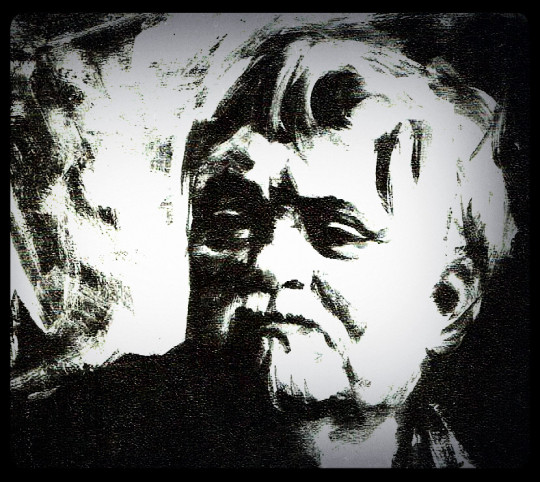
«Quizás no hay error más funesto que el que consiste en concebir el yo como el reducto o la guarida de la originalidad. Para comprenderlo mejor hay que hacer intervenir aquí la noción injustamente desacreditada de los dones. Lo mejor de mí no me pertenece, no soy en absoluto su propietario, sino sólo depositario. No tiene ningún sentido preguntarse, a no ser en un registro metafísico que actualmente ya no es el nuestro, de dónde vienen estos dones, cuál es su procedencia. Por el contrario, lo que importa de entrada es saber qué actitud adoptaré ante ellos. Si los miro como un depósito que estoy obligado a hacer fructificar, es decir, en el fondo como la expresión de una llamada que me ha sido dirigida, o incluso a veces como la expresión de una cuestión que se me ha planteado, no pensaré en enorgullecerme por ello y en pavonearme delante de otros, es decir, de nuevo ante mí mismo.»
Gabriel Marcel: «Yo y el otro», en Homo viator. Editorial Sígueme, pág. 31. Salamanca, 2005.
TGO
@bocadosdefilosofia
@dias-de-la-ira-1
#marcel#gabriel marcel#homo viator#yo y el otro#existencialismo#filosofía conemporánea#originalidad#don#dones#yo#teo gómez otero
3 notes
·
View notes
Quote
My freedom is not and cannot be something that I observe as I observe an outward fact; rather it must be something that I decide, moreover, without appeal. It is beyond the power of anyone to reject the decision by which I assert my freedom and this assertion is ultimately bound up with the consciousness that I have of myself.
Gabriel Marcel, The Mystery of Being
76 notes
·
View notes
Text

2 notes
·
View notes
Photo
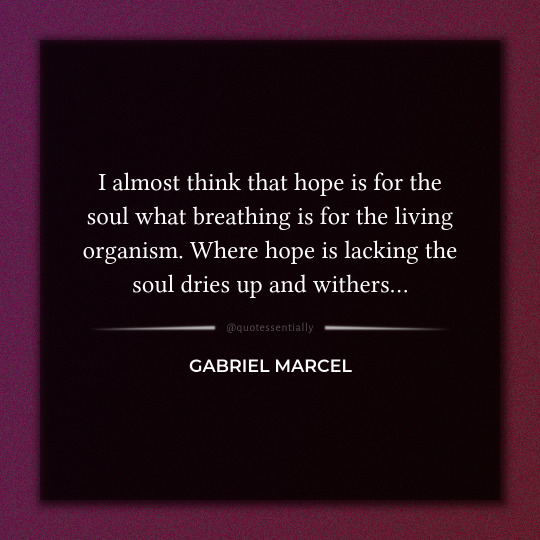
From Gabriel Marcel’s Homo Viator
10 notes
·
View notes
Text
“Khi tôi nói rằng tôi yêu em, có nghĩa là em bất tử”
— Gabriel Marcel

9 notes
·
View notes
Text
Note contemplative - Gabriel Marcel, Homo Viator - Prolégomènes à une métaphysique de l’espérance
Note contemplative - Gabriel Marcel, Homo Viator - Prolégomènes à une métaphysique de l’espérance #Philosophie #MardiCestPhilosophie #Contemplation #GabrielMarcel #Camus #Sartre #Métaphysique #Espérance
Notes contemplatives de lecture – Note contemplative n° 40
Aucune explication verbale ne remplace jamais la contemplation. Saint-Exupéry, Pilote de guerre.
Notes de lecture
[La] plupart de ces études furent écrites sous l’Occupation. […] En 1942-1943, ma pensée était comme polarisée par l’idée de la future Libération. On savait alors très exactement ce qu’on espérait. En est-il de même…
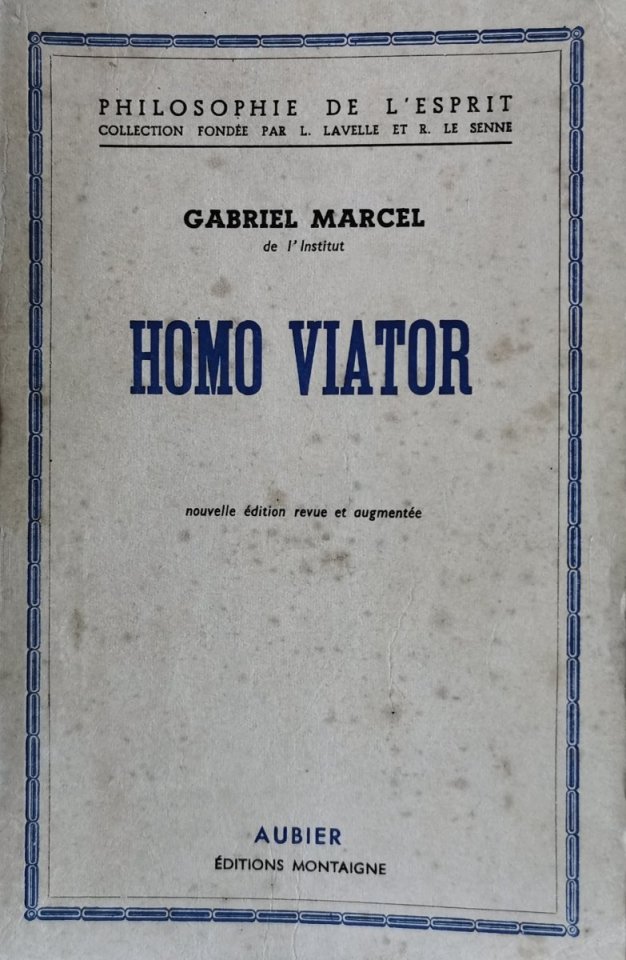
View On WordPress
#MardiCestPhilosophie#Camus#Contemplation#Espérance#Gabriel Marcel#Homo Viator#Mardi c’est philosophie#Métaphysique#Notes contemplatives#Philosophie#Sartre
2 notes
·
View notes
Text
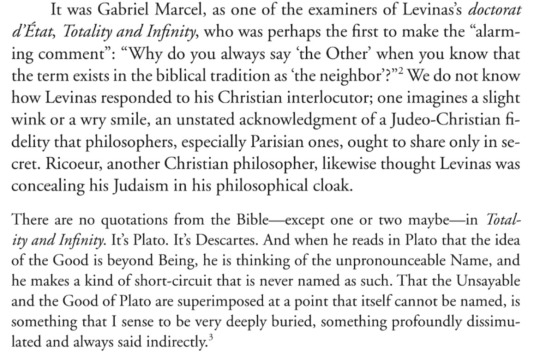
Michael Fagenblat, A Covenant of Creatures
4 notes
·
View notes
Text
La vida es una lucha contra la nada.
Gabriel Marcel
5 notes
·
View notes
Text
“If I may come back to the concepts of Gabriel Marcel, Faust, the frenzied activist, foregoes being in favor of having. But having divested of being is illusory. It is impregnated with a limitless and eternal insatiability which leads to destruction. The man of ‘free inquiry,’ untied to the anchor of faith, is hell-bound. In the same scene in which Faust pronounces a solemn curse on Love, Faith and Hope, he signs a contract with the salesman of Nothingness. It is significant that he adds ‘Patience’ to his triple curse.
‘And cursed, above all, be patience!’
To the modern temper of activism, patience—literally, the virtue of ‘suffering’—is inacceptable. And yet, it is only in this that we can find redemption. Let us suppose that Goethe had allowed Faust to earn his eternal salvation only by the great humanitarian works he achieves at the end of Part Two. The solution would have been pat and ‘modern.’ But it would have been untrue. Nothing shows more the character of Goethe as one of the mystic and prophetic illuminati—that he was not content with that solution.
The spirit of unbridled activism, of insatiable curiosity and conquest, needs womanhood, the holy passivity of the ‘be it done unto me,’ as its complement. This is the nuptial union of being.”
— Karl Stern: The Flight from Woman
3 notes
·
View notes
Text

0 notes
Text
“It’s not hard to imagine how badly Vitale’s question must have wounded Shklovsky in his dotage. This was, after all, the same Shklovsky who had waged an artistic revolution—one that paralleled but did not always coincide with the Bolsheviks’—with no less at stake than the liberation of human consciousness; the same Shklovsky who had seen at least two brothers and most of his friends (an illustrious literary crew including Vladimir Mayakovsky, Osip Mandelstam and Yevgeny Zamyatin) disappeared, executed, or driven to suicide or exile by the Soviet establishment; the same Shklovsky who had twice been injured in battle fighting for a revolution that had already begun to hunt and humiliate him; who endured cold and hunger and exile and squirmed through years of silence under the censor’s heavy thumb; the same Shklovsky who spent most of his intellectual life championing the emancipatory power of the novel and fighting to blast it—and all of literature and even, yikes, reality—out of subservience to a host of dumb and arbitrary masters.
The establishment, him! Shklovsky had from the start fought for a notion of art directly opposed to socialist realist pieties, one that hinged on the need to push beyond established models, to make things strange so that we might see the world afresh in its cruelty and splendor. He had been at odds not just with the bureaucratic state that congealed in the wake of the revolution, but with stasis itself, with the crust that the world of things deposits on our senses, with routine’s unending murder of the real. Innovation must occur in art, Shklovsky had written as recently as 1970, “because humanity fights for the expansion of its right to life, for the right to search and attain new kinds of happiness.” But age had mellowed the insurrectionist. Shklovsky called Vitale a few hours later to apologize: “My God, I made you cry, forgive this crabby old man.”
(…)
What emerges from these works is a group portrait of Shklovsky’s Formalism—even the name dries the mouth—that bears little resemblance to any school of literary criticism that has arisen in the West in the last century or, well, ever. It was born not in the academy but out of the literary avant-garde and alongside the Russian Revolution. Ironically, given the Formalists’ insistence on literature’s divorce from worldly events, it arose without even a hair’s distance from the tumult that rocked Europe for most of the early twentieth century. When the revolution erupted in February 1917—“it was like Easter,” Shklovsky would recall, “a joyous, naïve, disorderly carnival paradise”—he was already an insurrectionist, though of a different sort from Lenin or Trotsky. Years later, when Vitale asked him what the revolution had meant to him, Shklovsky would answer, “the dictatorship of art. The freedom of art.”
At the beginning of the 1910s, Shklovsky had befriended the young Futurist poets Velimir Khlebnikov and Vladimir Mayakovsky and, while still a student, had become the Futurists’ theoretical champion. The world was sick and palsied—who can now deny it?—so thoroughly smothered in vestigial tradition and used-up forms that it couldn’t even be properly perceived. “Do something undreamed-of,” demanded Khlebnikov, “strictly new, you horses pulling the hearse of the world!” Out of the radical poetics of the Futurists, Shklovsky and a few comrades founded Opoyaz (an acronym for “Society for the Study of Poetic Language”), the nucleus of the critical movement that would later be called Russian Formalism, in the kitchen of an abandoned St. Petersburg apartment.
(…)
These and other sundry obstacles, all of them oriented toward rupturing the smooth flow of narrative, are tools in the service of what Shklovsky called ostranenie, which is variously translated as “estrangement,” “defamiliarization” or simply “making strange.” In Theory of Prose, Shklovsky would distinguish between “recognition” and “seeing.” Ordinary perception falls into the former category: we don’t see objects so much as recognize them according to pre-existing patterns of thought. The world arrives “prepackaged” and passes us by without a graze. “And so, held accountable for nothing, life fades into nothingness. Automatization eats away at things, at clothes, at furniture, at our wives, and at our fear of war.”
The point for Shklovsky was to find a way to shake ourselves out of this collective stupor so that we might see the world in all its startling brightness and, presumably, act on what we see. (An unacknowledged politics hides behind Shklovsky’s poetics, a quasi-anarchist insistence on permanent revolt, but that is an argument for another essay.) For this, “man has been given the tool of art,” which—and this is where ostranenie comes in—employs various tactics to defamiliarize the world, to allow us to see it as if for the first time. If it is anything, art is oppositional and insurrectionary, and literature an authorial conspiracy to overthrow anachronistic modes of thought. “Art,” Shklovsky wrote in A Sentimental Journey, “is fundamentally ironic and destructive. It revitalizes the world.”
This position leads him to some surprising places: first, to a notion of literary change based on rupture rather than influence and inheritance. Art changes not out of fashion or habit, but because it must. New forms are created when the old ones become as sclerotic as the ones they replaced. (No wonder Shklovsky made the Bolsheviks edgy.) Second, the practice of literary criticism involves a quest for ostranenie that parallels the artist’s. (In 1972, the Marxist literary theorist Frederic Jameson would somewhat snidely call Shklovsky’s critical works, of which he had not read many, “little more than an endless set of variations” on the idea of ostranenie.) If the critic is to see the object of his study sufficiently to analyze its workings, he must “extricate” it “from the cluster of associations in which it is bound.” So while language may be subject to all the usual social and economic forces, literature, if it is to be seen at all, must be looked at on its lonesome.
From there, Shklovsky leaps a few wide boulevards and, post-extrication, tosses out all the scraps from which the work emerged: “No more of the real world impinges upon a work of art than the reality of India impinges upon the game of chess,” he wrote in Theory of Prose with characteristic modernist élan. This means that any erstwhile “content” we might imagine clinging to the work (whatever a book is ostensibly “about”) is no more than a function of “form,” of whatever combination of stylistic devices the author has brought to bear. Plot is mere structural play.
If this sounds counterintuitive, it was—and remains—an intensely fruitful insight. Shklovsky’s audacity gave him the freedom to take apart Cervantes and Sterne, Gogol and Tolstoy, with a brilliance that still dazzles ninety years later. And it allowed works of literature to become visible, not as natural objects like fingernails or trees, but as complex creatures of artifice, as purposeful forms of play. This notion did not go down smoothly. As the ’20s dragged on and Soviet aesthetic attitudes became more rigid, art had only two options: it could be an organic growth of proletarian consciousness, or counterrevolutionary poison. Shklovsky’s Formalism made him, in the words of an unnamed KGB interrogator quoted by Vitale, “an enemy of the real world and [of] socialist realism in literature.”
(…)
But literature, the young Shklovsky insists, is its own planet, bound by the rules that it creates. “Art,” he wrote in Zoo, “if it can be compared to a window at all, is only a sketched window.” Its point is not to accurately reflect this same old cruddy, shrink-wrapped world, but to steal us new sets of eyes, to forge new and unimagined senses. This is art’s one virtue, its promise and delight. And the novel, call it dead or alive, is not a thing among things of a certain weight and size, obliged to obey established formulae. It is a weird box of almost bottomless openness, a compact revolution in a cloth and cardboard binding. Or, if you prefer, in pixels.
(…)
But Shklovsky lived long enough (outliving many of his persecutors) to do some rethinking. By the time Vitale knocked at his door in 1978, he had published Bowstring, in which he displayed an earnest effort to sort through the contradictions of his youth. “Back then I used to say that art had no content, that it was devoid of emotion,” he marvels, “while at the same time I wrote books that bled.” Through analyses of Homer, Sophocles, Shakespeare, Dostoevsky, Rabelais, Updike (yes, him) and, as always, Sterne, Cervantes and Tolstoy, he lays out a heretical, softer and less formal Formalism. Ostranenie, Shklovsky writes, “can be established only by including the notion of ‘the world’ in its meaning. This term simultaneously assumes the existence of a so-called content.” He holds tight, though, to the importance of contradiction, anachronism, disharmony, which provide the needed tension from which art derives its powers. “If one can say that imagination is better than reality, art is even better,” he explained to Vitale, “because it’s the dream of every structure’s collapse and at the same time the dream of the construction of new structures.”
(…)
None of it adds up. But that’s OK, that’s the whole point, that’s what we’re doing here, even if it hurts. Especially when it hurts. Shklovsky reassures us:
Unity, reader, is in the person who is looking at his changing country and building new forms of art so they can convey life… Browse through our works, look for a point of view, and if you can find it, then there is your unity.
I was unable to find it.”

“September I5, 1988
Dear Ken,
Do you know anybody who can translate Russian to English? (I am thinking of your faculty friend who sent you - and me - the info on Viktor Schklovsky.) What I need to know is how he would translate the two famous opposed literary devices of Schklovsky. The words: obnazhenie and ostranenie. I suspect they mean defamiliarization and overfamiliarization, but don't know. How about a hand? Ain't no Russians here. I greatly prize "Pragmaticism is an Existentialism?"
All best,
Walker [s]
P.S.: The reason these Russian words are important to me is that they fit in well with my notion of the evolution/devolution of symbols, so that a thing/event can come to be cancelled by a symbol/word, hardened through over-familiarity into what Gabriel Marcel called a “simulacrum” - same event/thing can be recovered in times of disaster or great poetry - simulacrum broken, being revealed as being, etc. Thanks, WP”
#shklovsky#victor shklovsky#literary criticism#russian formalism#bolshevism#soviet literature#russian literature#mayakovsky#obnazhenie#ostranenie#percy#walker percy#ketner#kenneth laine ketner#marcel#gabriel marcel#simulacrum#being
6 notes
·
View notes
Text
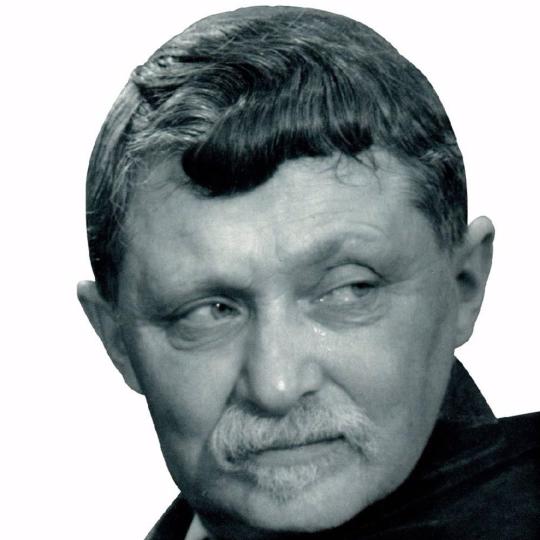
«Esta contradicción se manifiesta aquí por todas partes. En ningún sitio aparece más de relieve que en la actitud tan bien designada por el lenguaje corriente bajo el nombre de pose. El que adopta la pose, aquel que solo parece estar preocupado por los demás, en realidad no está ocupado más que consigo mismo. El otro, en efecto, sólo le interesa en la medida en que es capaz de formarse de él una imagen favorable que a su vez aquél hará suya. El otro reflexiona, le devuelve esa imagen que le encanta.»
Gabriel Marcel: «Yo y el otro», en Homo viator. Editorial Sígueme, págs. 28-29. Salamanca, 2005.
TGO
@bocadosdefilosofia
@dias-de-la-ira-1
#marcel#gabriel marcel#homo viator#yo y el otro#existencialismo#filosofía conemporánea#pose#imagen#el otro#otro#yo#teo gómez otero
1 note
·
View note
Text
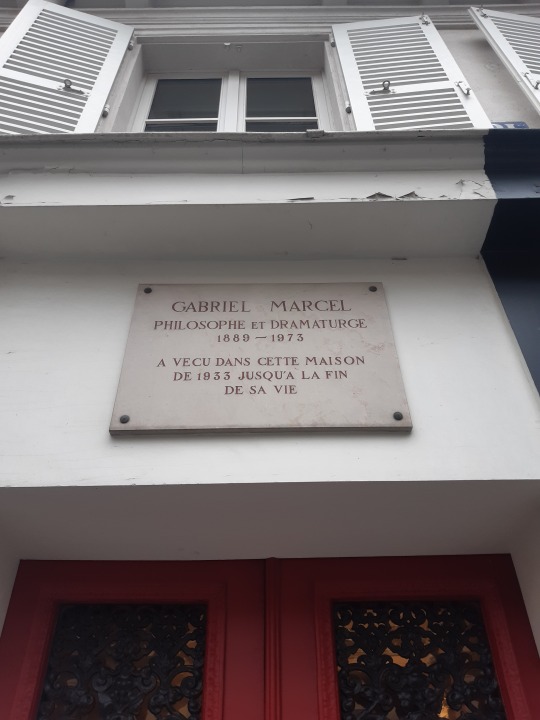
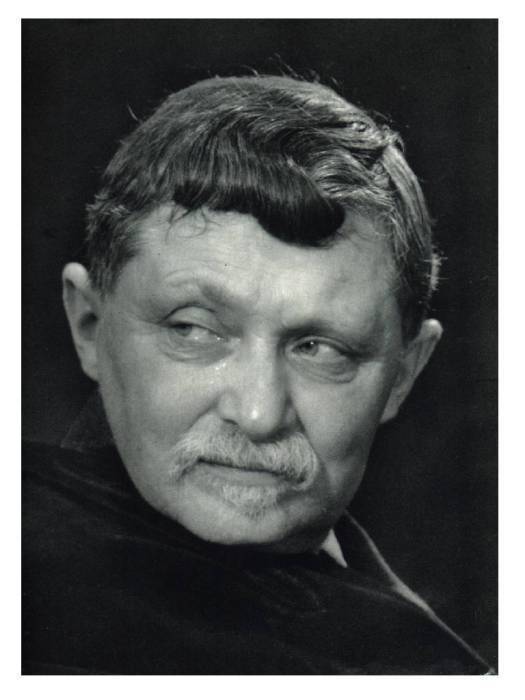
Plaque en hommage à : Gabriel Marcel
Type : Lieu de résidence
Adresse : 21 rue de Tournon, 75006 Paris, France
Date de pose :
Texte : Gabriel Marcel, philosophe et dramaturge, 1889-1973, a vécu dans cette maison de 1933 jusqu'à la fin de sa vie
Quelques précisions : Gabriel Marcel (1889-1973) est un dramaturge et philosophe français s'inscrivant dans le courant de l'existentialisme chrétien. Se consacrant à la fois à la philosophie et au théâtre, il rencontre peu de succès dans le deuxième domaine. Converti au catholicisme, sa philosophie se développe particulièrement dans les années 1930, donnant naissance à l'existentialisme chrétien, abordant des thèmes métaphysiques liés à la mort, à l'au-delà et à la transcendance. Il reçoit fréquemment chez lui de nombreux philosophes, penseurs et intellectuels. Il reçoit de nombreuses récompenses, dont le Grand prix de littérature de l'Académie française et le Grand prix national des Lettres en 1958, et est fait membre de l'Académie des sciences morales et politiques en 1952.
0 notes
Text


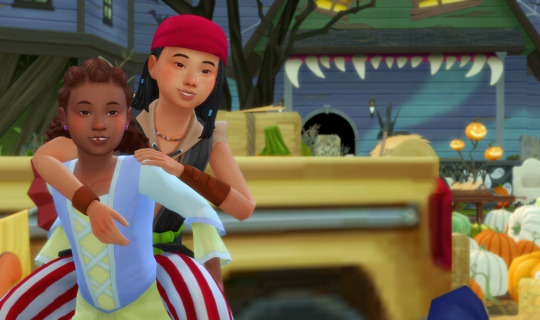
57 notes
·
View notes